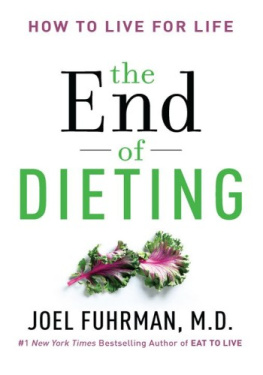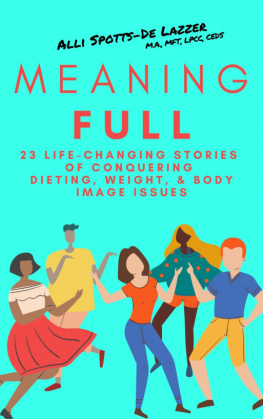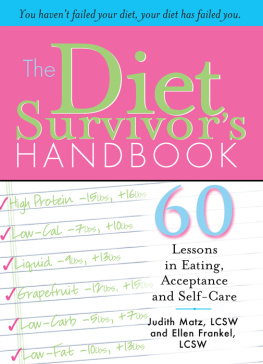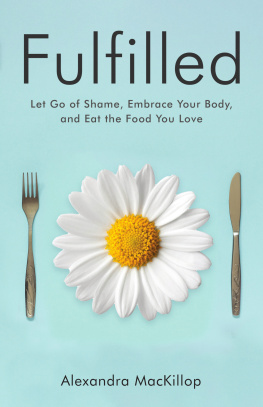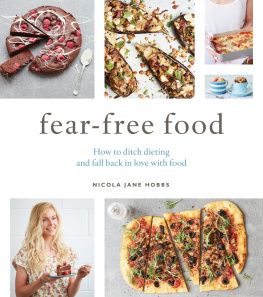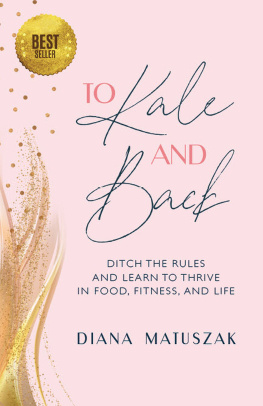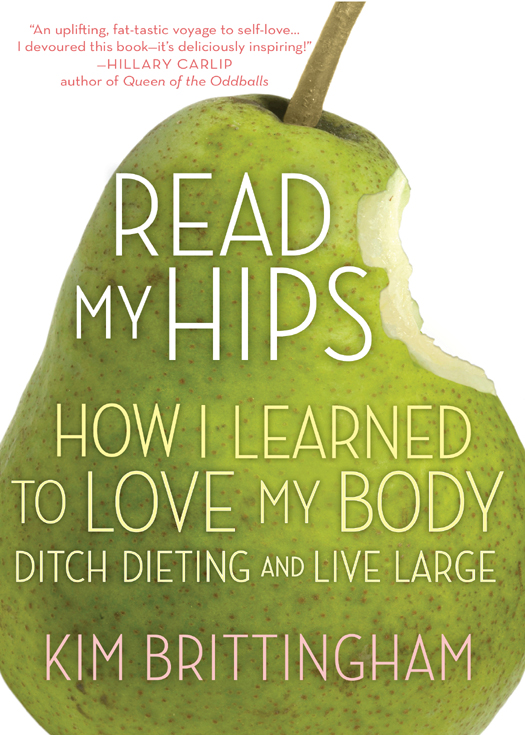
Praise for
READ MY HIPS
Kims voice is refreshing, real, brutally honest, and laugh-out-loud funny. Her words paint a vivid picture that is completely relatable. In my work or in my life, I have never met a woman (of any age, size, or shape) who did not experience body image issues or some degree of self-loathing. Kim poses great thought-provoking questions and her message is uplifting Love yourself as you areno matter what your size and shapeyou are already whole! A fabulous, fun read! Thanks, Kim, for your bravery.
Laurie Sliva, founder, director, and life-skills trainer, B.R.I.D.G.E.S. Programs for Girls
In Read My Hips, Kim entertainingly advocates a revolutionary way of being: accepting our here-and-now bodies as we are and with love. With wit, sensuality, and realistic logic, she shares her journey through time and transformation, baring her attitudes and discovering antidotes for our societys limited and limiting way of seeing our bodies. Kims sensuous love of the world and all its prickly details makes for a delightful and moving read.
Debora Iyall
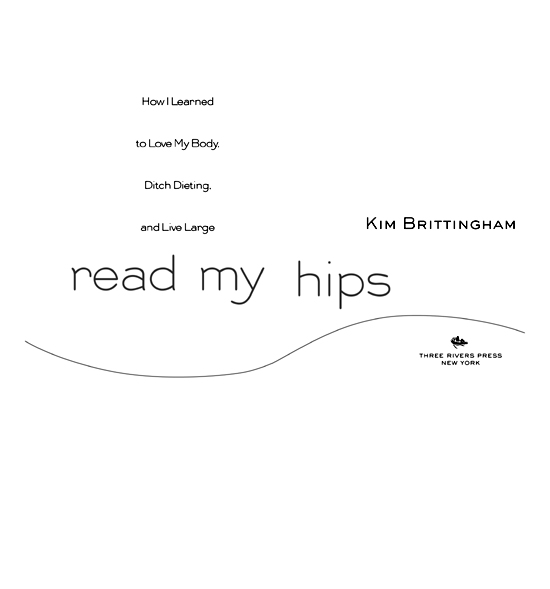
Copyright 2011 by Kimberly Brittingham
All rights reserved.
Published in the United States by Three Rivers Press, an imprint of the Crown Publishing Group, a division of Random House, Inc., New York.
www.crownpublishing.com
Three Rivers Press and the Tugboat design are registered trademarks of Random House, Inc.
Library of Congress Cataloging-in-Publication Data
Brittingham, Kim.
Read my hips : how I learned to love my body, ditch dieting, and live large / Kim Brittingham.1st ed.
p. cm.
1. Brittingham, Kim. 2. Overweight womenUnited StatesBiography. 3. Body image in womenUnited StatesCase studies. 4. Self-esteem in womenUnited StatesCase studies. 5. WomenUnited StatesPsychologyCase studies. 6. Reducing dietsUnited StatesCase studies. I. Title.
RC628.B69 2011
362.1963980092dc22
[B] 2010042801
eISBN: 978-0-307-46439-2
COVER DESIGN BY JESSIE SAYWARD BRIGHT
COVER PHOTOGRAPHY STIEF & SCHNARE/SUPERSTOCK
v3.1
F OR A UNT P HYLLIS AND P ERONNE
CONTENTS
AUTHOR S NOTE
The stories in this book are true. In many instances I really do recall, almost verbatim, dialogue from as far back as three decades ago. But in other instances, Ive done my best to re-create dialogue that feels accurate in both word choice and sentiment. In the case of phone messages from executives of 5W Public Relations, I still have word-for-word transcriptions of the messages as left on my answering machine. I jotted them down thinking I might use them in a blog entry; I wound up using them in this book instead. A few scant details of these stories have been changed as the years have simply erased various specifics from my mindand some on purpose, in order to protect the privacy of others. I have also changed most names, including that of the weight loss center where I worked, in the interest of privacy.
INTRODUCTION
READ MY HIPS
When I was a teenager, my mother took a picture of me standing in front of our house.
I stood unsmiling beside a flowering bush. I knew I was bigger and uglier than most girls, but maybe the camera would strike a deceptive angle and make me look pretty.
When the picture came back from the developer, I was mortified.
I was going to make sure no one ever saw this awful image of me. I stole it from its paper envelope and scurried away to my room.
I sat on the edge of the bed and stared at the semigloss print in my hands. I had no idea I was so misshapen! I knew I was pear-shaped; all the women in our family were. But genetics had hung themselves on my frame with an unnecessary flourish of cruelty. My hips ballooned out from my body, in freakish contrast to my trim waist. I was an extreme, like those apes with shockingly bulbous red bottoms.
I began to cry. My God, I thought. Im deformed!
Clearly, Id have to cover this up. Never again would I wear a shirt or sweater under thirty-two inches longor at least not until I fixed this problem. Id wear tunics and dumpy cardigans, and mens button-down shirts three sizes too big, just because they covered my hips.
I took the photo to my desk and with a fine-tipped black marker, oh-so-carefully, I shaved several inches off my hips, applying the ink in parentheses-like strokes until Id blacked out the swells of excess flesh. I sat up straight and regarded the image of myself with a normal body, and felt overcome by a surge of shimmering hope.
Pure possibility. It coursed through my veins like warm, flowery bathwater. The promise of improvement, of being better than this flabby, self-conscious, blemished sack of flesh I dragged between home and school every day. The suggestion that I might actually become the heroine of my daydreams. It was irresistible.
I could make it happen.
Id just go on a diet.
I dont ever remember my mother being fat, and yet I clearly remember her dieting. When I was growing up, she read many womens magazinesRedbook, Family Circle, Womans Day. As a stay-at-home mom, she watched day-time talk shows like Donahue. She was immersed in the popular culture of the day and so, like millions of other American women, she was exposed to the media onslaught of thinner is better messaging, both overt and covert.
There was this glossy two-page spread of diet tips by Richard Simmons that shed cut from one of her magazines and taped to her bedroom door. One of his suggestions was to use tiny childrens utensils for eating, because it would help one ingest less food. Above the type was a photo of a hammy Richard in a red polo shirt with white collar, holding a goofy oversized knife and fork, one in each hand, his mouth and eyes agape in comic exaggeration.
We moved around the country a lot, every couple of years or so. And everywhere we went, my mother carefully folded and stowed away her Richard Simmons diet tips, only to unfold and retape them to the bedroom door at our new address. The old tape grew brittle beneath the new, deepening to an unhealthy-looking, jaundice color and flaking away.
My mother started her dietsand eventually, our shared family dietsvery gung ho. There were inaugural trips to the supermarket, during which she stocked up on foods we usually never saw in our house. Like cottage cheese. She made lots of sweeping from now on statements: We wont be eating this anymore. Were going to start taking walks every night after dinner. Things are going to change around here! She made charts for each member of the family on which we could track our exercise, and in the case of my brother and sister and me, our chores and our homework, too (because sweeping dietary change was usually concurrent with recommitments to pitching in around the house and getting straight As). At the stationery store, Mom bought multicolored, star-shaped metallic stickers we could lick-and-stick to mark our daily victories. She experimented with her blender and we swallowed things made from powders. She made me get up an hour early and go jogging with my father before school. Jogging made me feel like I couldnt breathe, and I hated being forced into his company. The mood inside my Mork and Mindy lunchbox was dismal. Snack cakes and aluminum peel-top cans of pudding were gone. Sandwiches became wretchedly thin. We were eating special bread nowdiet bread, from the pink bag, sliced super-thin, so you can have


